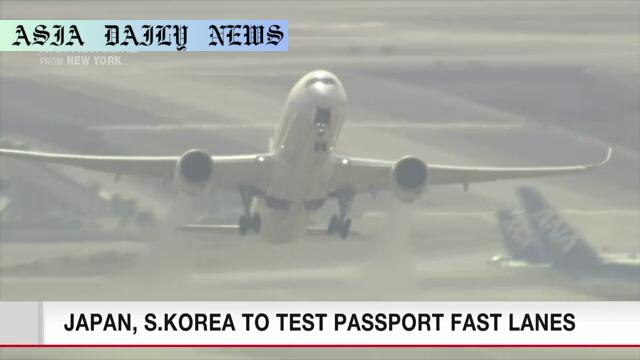passport fast lanes, Japan and South Korea governments plan to introduce fast lanes at airports to enhance travel convenience.

Introduction: Speeding Up International Travel
Japan and South Korea are set to launch an economic and traveler-friendly initiative aimed at expediting entry procedures for citizens of both countries. This is part of a broader agenda to strengthen bilateral ties and make cross-border journeys hassle-free. The plan introduces ‘passport fast lanes’ at four major airports, signifying a major step towards building seamless travel access. Notably, this move is expected to save time, minimize congestion at immigration counters, and cater to the substantial number of travelers recorded last year—over 12 million.
Testing Locations and Timeline
The pilot program will operate at select airports, including Haneda Airport in Tokyo, Fukuoka Airport in southwestern Japan, Gimpo International Airport in Seoul, and Gimhae International Airport in Busan. Scheduled to commence in June, these passport fast lanes aim to revolutionize travel by reducing wait times and promoting international collaboration between the two nations. Officials have outlined a testing period of approximately one month to assess feasibility and gather valuable data on its effectiveness.
Eligibility and Requirements
While the specifics of eligibility criteria are still under consideration, authorities are leaning toward allowing individuals with a history of recent travel between Japan and South Korea to use these fast lanes. This selective condition ensures the lanes are used efficiently and effectively by frequent or long-term travelers likely to benefit the most from streamlined procedures.
The Broader Implication: 60 Years of Diplomatic Ties
The introduction of passport fast lanes is particularly significant as it coincides with a milestone in Japan-South Korea relations—the 60th anniversary of normalized diplomatic relations. This collaboration serves as a testament to the countries’ commitment to strengthening bilateral cooperation beyond political, economic, and cultural collaborations. At a time when international travel is booming post-pandemic, moves like these are strategically positive for mutual growth, reducing cultural gaps, and enhancing people-to-people connectivity.
Traveler Records and Future Vision
With a record-breaking 12 million travelers moving between the two nations in the past year, the success of this initiative may pave the way for broader agreements on travel and collaboration. It signifies a conscious effort to facilitate mobility as countries worldwide compete to facilitate tourism and business exchanges. Should the pilot prove successful, other airports might adopt similar measures, underscoring the importance of innovation within the travel and transportation industries worldwide.
A Win-Win Initiative
This initiative is a promising effort with potentially high returns. For travelers, it means less waiting time and more convenience. For policymakers, it reiterates the value of strong bilateral ties while delving into practical challenges in policy execution. The plan is also a reflection of evolving international relations between East Asian powerhouses, signaling a shared commitment to economic growth and people-based diplomacy.
Commentary
Breaking Barriers in Cross-Border Mobility
The decision by Japan and South Korea to establish passport fast lanes is a groundbreaking move in facilitating international movement. It emphasizes the significance of time-efficient solutions for frequent travelers. While the details are yet to be finalized, the effort symbolizes modern nations adapting to shifting trends in global travel. The mere planning of such a scheme highlights the trust and collaboration between Tokyo and Seoul, showing that even historical differences can be cast aside for a shared purpose.
A Traveler’s Perspective
For millions who travel between these nations yearly, this development is undoubtedly thrilling. Long wait lines and procedural bottlenecks can take away from the excitement of international adventures or critical business engagements. With fast lanes, visitors can save time and energy. More importantly, this initiative shows countries responding directly to the demands and feedback of their traveling populace, an accomplishment worth appreciating.
Influence on Broader Diplomacy
The timing of the project is symbolic, aligning with the 60th anniversary of their diplomatic relations. Beyond travel convenience, it speaks to strengthening bonds in regions that have seen tensions in the past. Passport fast lanes, while operationally minor, indicate the cultural and economic integration of two nations envisioning a progressive future together.
The Growing Need for Travel Innovation
As travel resumes globally post-pandemic, initiatives like this highlight the evolving needs of international travelers and indicate the pivotal role innovation plays in tourism and business mobility. Such projects provide a template for other countries to rethink their immigration policies and ensure a balance between security and convenience. Overall, Japan and South Korea prove yet again that international collaboration in today’s age must focus on bridging gaps rather than creating them.


